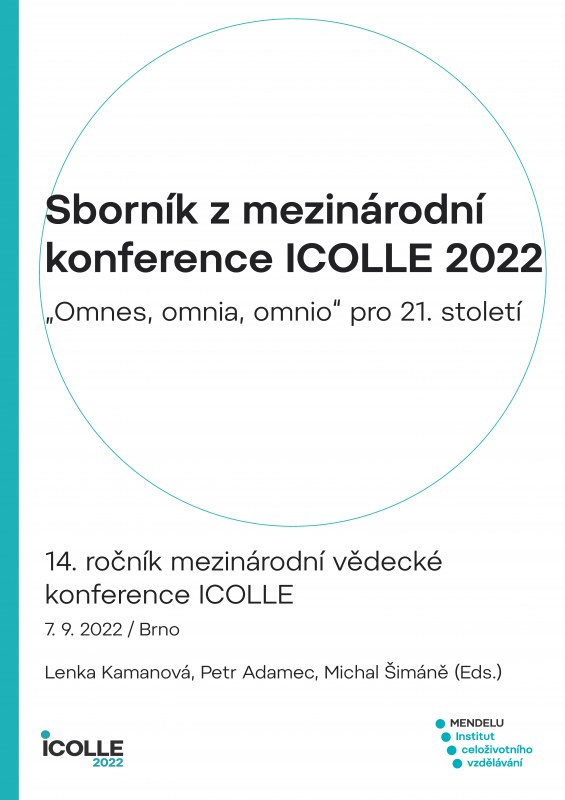
DOI: 10.11118/978-80-7509-922-8-0265
DRUHOŠANCOVÉ VZDELÁVANIE ŽIAKOV BEZ ZÁKLADNÉHO VZDELANIA A SO ZÁKLADNÝM VZDELANÍM NA SLOVENSKU
- Valentína Šuťáková, Janka Ferencová
In recent years, there has been more and more talk in our environment about second-chance education and especially about the need to improve it, greater individualization in relation to the needs of learners, or a more comprehensive system of support and counseling. We have started to deal with this issue more in detail within the project of Slovak research and development agency. In our contribution we would like to present the partial results of this project. Based on domestic and foreign studies (Ross, Sh., & Gray, J., 2005; Lamb, S., et al., 2018; Savelsberg, H., Pignata, S., & Weckert, P., 2017; Hall, R., 2019; Pirohová, I., Lukáč, M., & Lukáčová, S., 2020) as well as our own findings, we decided to map the specifics of the educational process of adult students without basic aducation and with basic education. We focused on their motivation for education, their characteristics, the causes of early school leaving, educational barriers, but also on formal aspects and content of the educational process of these students. As the basic research method, we choose semistructired interview, which we conducted with teachers of second-chance education in Slovak schools. The results point to a number of persistent problems related to law individual support and counseling for these students, insufficient readiness of teachers to work with adults and adults from socially disadventaged environments in the context of second-chance education and an absent systemic apporach to this issue.
Keywords: econd-chance education, adult student, student from socially disadventaged environment, student without basic education
pages: 265-272, online: 2023
References
- Biebla kniha o vzdelávaní a príprave. Vyučovanie a vzdelávanie - smerom k učiacej sa spoločnosti [White Paper on Education and Training. Teaching and Learning Towards the Learning Society. 1995] [online]. (1995). Dostupné z: http://europa.eu/documents/comm/whitepapers/pdf/com95_590_en.pdf
- Inbar, D. & Sever, R. (1989) The Importance of Making Promises: An Analysis of Second-chance Policies. Comparative Education Review, (33)2, 232-242.
 Go to original source...
Go to original source... - Hall, R., et al. (2019). Analýza zistení o stave školstva na Slovensku: To dá rozum. Bratislava: MESA10. Dostupné z: htpps://analyza.todarozum.sk
- Keogh, H. (2009) The State and Development of Adult Learning and Education in Europe, North America and Israel: Regional Synthesis Report, Hamburg: UNESCO Institute for Lifelong Learning. Dostupné z: http://www.unesco.org/fileadmin/MULTIMEDIA/INSTITUTES/UIL/ confintea/pdf/GRALE/confinteavi_grale_paneurope_synthesis_en.pdf
- Kešelová, D., Grandtnerová, L. & Urdziková, J. (2016). Integrácia mladých ľudí s nízkym vzdelaním na trh práce: vzdelanie druhej šance. Záverečná správa z výskumnej úlohy. Bratislava: Inštitút pre výskum práce a rodiny. Dostupné z: http://www.ceit.sk>vyskum>2016>Keselova PDF
- Lamb, S., et al. (2018). Improving Participation and Success in VET for Disadvantaged Learnes. Adelaide: NCVER.
- Pirohová, I., Lukáč, M. & Lukáčová, S. (2019). Vzdelávanie dospelých Rómov z marginalizovaných komunít. Prešov: Prešovská univerzita v Prešove.
- Rigová, E., Dráľová, A. & Kováčová, L. (2021). Druhošancové vzdelávanie na Slovensku. Implementačná prax a jej bariéry. Bratislava: Inštitút pre dobre spravovanú spoločnosť. Dostupné z: https://www.governance.sk/gov_publication/druhosancove-vzdelavanie-na-slovensku/
- Ross, S. & Gray, J. (2005). Transitions and Re-engagement through Second Chance Education. The Australian Educational Researcher, 32(3), 103-140. Dostupné z: https://files.eric.ed.gov>fulltext PDF
 Go to original source...
Go to original source... - Savelsberg, H., Pignata, S. & Weckert, P. (2017). Second chance education: barriers, supports and engagement strategies. Australian Journal of Adult Learning, 57(1), 36-57.
- Štátna školská inšpekcia. Správa o stave a úrovni výchovy a vzdelávania v školách a školských zariadeniach v SR v školskom roku 2017/18. Dostupné na https://www.ssiba.sk/
- Stratégia celoživotného vzdelávania a poradenstva na roky 2021-2030 schválená vládou SR. Dostupné z: https://www.minedu.sk/data/att/22182.pdf0
- Strauss, A. & Corbinová, J. (1999). Základy kvalitatívneho výskumu_ postupy a techniky metody zakotvené teorie- Brno: Albert Boskovice.
- Šuťáková, V. & Lenhardtová, M. (2021). Profesijný rozvoj učiteľov v kontexte druhošancového vzdelávania. In: Krystoň, M. (ed.). Andragogické štúdie 2021. Banská Bystrica: BELIANUM, s. 138-147.
- Švaříček, R., Šeďová, K. a kol. Kvalitatívní výzkum v pedagogických vědách. Praha: Portál.
- Švec, Š. (2004). Slovník definovaných anglicko-slovenských termínov pedagogiky a andragogiky s abecedným registrom slovensko-anglických ekvivalentov. Prešov: Metodicko-pedagogické centrum.
- Vyhláška MŠ SR č. 320/2008 o ZŠ Dostupné z: http://www.minedu.sk/vyhlasky
- Zákon č. 245/2008 Z. z. o výchove a vzdelávaní (Školský zákon) a o zmene a doplnení niektorých zákonov [online]. Dostupné z: https://www.minedu.sk/12272-sk/zakony
- Zákon č. 61/2015 Z. z. o odbornom vzdelávaní a príprave a o zmene a doplnení niektorých zákonov. Dostupné z: https://www.minedu.sk/12272-sk/zakony/


